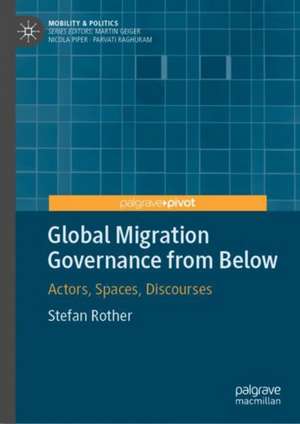Global Migration Governance from Below: Actors, Spaces, Discourses: Mobility & Politics
Autor Stefan Rotheren Limba Engleză Hardback – 23 iul 2022
Din seria Mobility & Politics
-
 Preț: 383.12 lei
Preț: 383.12 lei -
 Preț: 385.25 lei
Preț: 385.25 lei -
 Preț: 451.65 lei
Preț: 451.65 lei -
 Preț: 450.11 lei
Preț: 450.11 lei -
 Preț: 385.62 lei
Preț: 385.62 lei -
 Preț: 416.92 lei
Preț: 416.92 lei -
 Preț: 419.06 lei
Preț: 419.06 lei -
 Preț: 384.86 lei
Preț: 384.86 lei -
 Preț: 415.18 lei
Preț: 415.18 lei -
 Preț: 384.48 lei
Preț: 384.48 lei -
 Preț: 415.77 lei
Preț: 415.77 lei - 15%
 Preț: 469.41 lei
Preț: 469.41 lei -
 Preț: 385.47 lei
Preț: 385.47 lei -
 Preț: 382.95 lei
Preț: 382.95 lei -
 Preț: 418.07 lei
Preț: 418.07 lei -
 Preț: 422.70 lei
Preț: 422.70 lei -
 Preț: 418.67 lei
Preț: 418.67 lei -
 Preț: 391.61 lei
Preț: 391.61 lei -
 Preț: 385.84 lei
Preț: 385.84 lei -
 Preț: 446.47 lei
Preț: 446.47 lei -
 Preț: 476.95 lei
Preț: 476.95 lei -
 Preț: 376.22 lei
Preț: 376.22 lei - 18%
 Preț: 890.37 lei
Preț: 890.37 lei -
 Preț: 379.30 lei
Preț: 379.30 lei -
 Preț: 482.56 lei
Preț: 482.56 lei -
 Preț: 385.84 lei
Preț: 385.84 lei - 18%
 Preț: 722.26 lei
Preț: 722.26 lei -
 Preț: 320.95 lei
Preț: 320.95 lei - 15%
 Preț: 695.34 lei
Preț: 695.34 lei -
 Preț: 319.21 lei
Preț: 319.21 lei - 15%
 Preț: 639.73 lei
Preț: 639.73 lei -
 Preț: 325.36 lei
Preț: 325.36 lei - 18%
 Preț: 782.57 lei
Preț: 782.57 lei -
 Preț: 383.33 lei
Preț: 383.33 lei -
 Preț: 416.92 lei
Preț: 416.92 lei -

-

-

Preț: 384.09 lei
Nou
Puncte Express: 576
Preț estimativ în valută:
73.50€ • 76.93$ • 61.17£
73.50€ • 76.93$ • 61.17£
Carte tipărită la comandă
Livrare economică 31 martie-14 aprilie
Preluare comenzi: 021 569.72.76
Specificații
ISBN-13: 9783031069833
ISBN-10: 3031069838
Ilustrații: XI, 127 p. 1 illus.
Dimensiuni: 148 x 210 mm
Greutate: 0.32 kg
Ediția:1st ed. 2022
Editura: Springer International Publishing
Colecția Palgrave Macmillan
Seria Mobility & Politics
Locul publicării:Cham, Switzerland
ISBN-10: 3031069838
Ilustrații: XI, 127 p. 1 illus.
Dimensiuni: 148 x 210 mm
Greutate: 0.32 kg
Ediția:1st ed. 2022
Editura: Springer International Publishing
Colecția Palgrave Macmillan
Seria Mobility & Politics
Locul publicării:Cham, Switzerland
Cuprins
1 Introduction: A bottom- up perspective on global migration governance.- 2 How did we get here? Civil society in the emerging regional and global governance framework on migration.- 3 What are we talking about? Dominant paradigms.- 4 Alternative discourses (What are we talking about?).- 5 Who are the (other) actors and what are their strategies? Alternatives to the alternative discourses.- 6 Conclusion.
Notă biografică
Stefan Rother is Professor pro tempore for Flight, Migration and Social Mobility at the University of the Bundeswehr Munich, and Senior Researcher at the Arnold-Bergstraesser-Institute at the University of Freiburg, Germany. His research focus is on international migration, the democratisation of global governance, social movements, regional integration, development and non-/post-Western theories of international relations. He has conducted extensive fieldwork in Southeast Asia as well as participant observation at global governance fora and civil society parallel and counter-events including the UN, ILO, ASEAN and WTO-level as well as the European Forum on Migration and World Social Forum on Migration. Stefan Rother has published articles in the Journal of Ethnic and Migration Studies, Third World Quarterly, Cooperation and Conflict, Comparative Migration Studies, International Migration, Migration Studies, Globalizations, European Journal of East Asian Studies, Asian and Pacific Migration Journal, Asia Pacific Viewpoint and several edited volumes. He has published and edited several books, including Democratization through Migration? Political Remittances and Participation of Philippine Return Migrants (with Christl Kessler, 2016).
Textul de pe ultima copertă
After a long time of neglect, migration has entered the arena of international politics with a force. The 2018 Global Compact for safe, orderly and regular migration (GCM) is the latest and most comprehensive framework for global migration governance. Despite these dynamics, migration is still predominantly framed as a state-centric policy issue that needs to be managed in a top-down manner. This book proposes a difference approach: A truly multi-stakeholder, multi-level and rights-based governance with meaningful participation of migrant civil society. Drawing on 15 years of participant observation on all levels of migration governance, the book maps out the relevant actors, “invited” and “invented” spaces for participation as well as alternative discourses and framing strategies by migrant civil society. It thus provides a comprehensive and timely overview on global migration governance from below, starting with the first UN High Level Dialogue in 2006, evolving around the Global Forum on Migration and Development (GFMD) and leading up to the consultations for the International Migration Review Forum in 2022.
Stefan Rother is Professor pro tempore for Flight, Migration and Social Mobility at the University of the Bundeswehr Munich, and Senior Researcher at the Arnold-Bergstraesser-Institute at the University of Freiburg, Germany. His research focus is on international migration, the democratisation of global governance, social movements, regional integration, development and non-/post-Western theories of international relations. He has conducted extensive fieldwork in Southeast Asia as well as participant observation at global governance fora and civil society parallel and counter-events including the UN, ILO, ASEAN and WTO-level as well as the European Forum on Migration and World Social Forum on Migration. Stefan Rother has published articles in the Journal of Ethnic and Migration Studies, Third World Quarterly, Cooperation and Conflict, Comparative Migration Studies, International Migration, Migration Studies, Globalizations, European Journal of East Asian Studies, Asian and Pacific Migration Journal, Asia Pacific Viewpoint and several edited volumes. He has published and edited several books, including Democratization through Migration? Political Remittances and Participation of Philippine Return Migrants (with Christl Kessler, 2016).
Caracteristici
Addresses a critical issue that has thus far only received limited academic attention Deepens readers' comprehension of the spectrum of actors involved with the process of global migration Gives voice to an often marginalized group pf people
